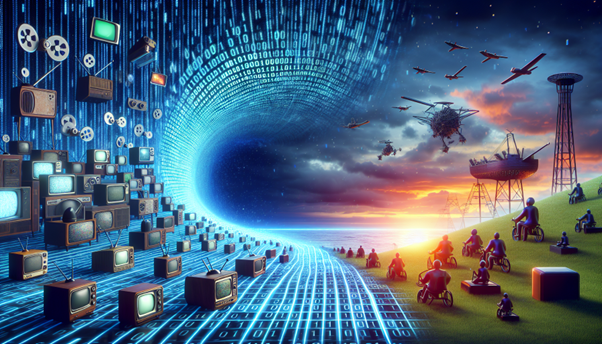Have you ever stopped to consider how the digital age has transformed the way we entertain ourselves? From the days of radio dramas to the immersive experiences offered by modern video games, our quest for entertainment has been a driving force behind technological innovation. But what does the future hold for online entertainment, and how will it continue to evolve?
The internet has revolutionized nearly every aspect of our lives, and entertainment is no exception. Today, we have access to a plethora of online platforms that cater to our every whim. Take, for example, Big Dollar Casino, which offers a virtual escape to the thrilling world of gambling from the comfort of your home. But it’s not just about the convenience; it’s about the experience. These platforms use cutting-edge technology to create immersive environments that rival their real-world counterparts.
- Virtual Reality (VR): Imagine donning a headset and being transported to a concert with thousands of other fans, all from your living room.
- Augmented Reality (AR): Or what about pointing your smartphone at a tabletop and watching a game unfold as if the characters were right there in front of you?
These are not just fantasies; they are the realities of today’s entertainment landscape. And as technology continues to advance, we can only speculate about the possibilities. Will we one day be able to experience a movie as if we were a character within it? The potential for such immersive experiences could redefine entertainment as we know it.
The Cultural Impact of Online Platforms
The way we consume entertainment has cultural implications that extend far beyond our screens. The global connectivity afforded by the internet has led to a cross-pollination of cultural content, creating a melting pot of entertainment that can be accessed by anyone with an internet connection. This has had a profound effect on how we perceive the world and understand different cultures.
Consider how streaming services have made international films and television shows readily available to a wide audience. This exposure to diverse storytelling has broadened our horizons and fostered a greater appreciation for the art of filmmaking from various corners of the globe. But it’s not just about passive consumption; the internet has also given rise to new forms of interactive entertainment.
- Social Media: Platforms like Instagram and TikTok have transformed ordinary individuals into content creators, blurring the lines between consumer and producer.
- Gaming: Online multiplayer games have created communities where players from different countries and cultures come together to share experiences.
These platforms are not just changing the way we entertain ourselves; they are changing the way we interact with each other. They are breaking down barriers and building bridges between cultures, creating a more interconnected world.
The Future of Online Entertainment: What Lies Ahead?
As we peer into the crystal ball of online entertainment, what can we expect to see in the coming years? The possibilities are as limitless as our imagination, but one thing is certain: the demand for more interactive and personalized experiences will continue to drive innovation.
Artificial intelligence (AI) is poised to play a significant role in shaping the future of entertainment. With AI, platforms can tailor content to individual preferences, creating a unique experience for each user. But the potential of AI goes beyond personalization. Imagine AI-generated music that adapts to your mood or interactive stories that change based on your decisions.
- Interactive Storytelling: Choose-your-own-adventure style narratives that adapt to your choices.
- Personalized Content: AI-curated playlists and recommendations that understand your tastes better than you do.
As we embrace these advancements, we must also consider the ethical implications. How will data privacy be managed? What impact will increased screen time have on our health? These are important questions that will need to be addressed as we navigate the future of online entertainment.
In conclusion, the evolution of online entertainment is an ongoing journey, one that mirrors our own evolution as a society. As we continue to explore new technologies and push the boundaries of what is possible, we must also remain mindful of the impact these changes have on our culture and our lives. The digital renaissance is here, and it’s up to us to shape it into an era that will be remembered for its innovation, inclusivity, and, most importantly, its ability to bring joy to people around the world.



